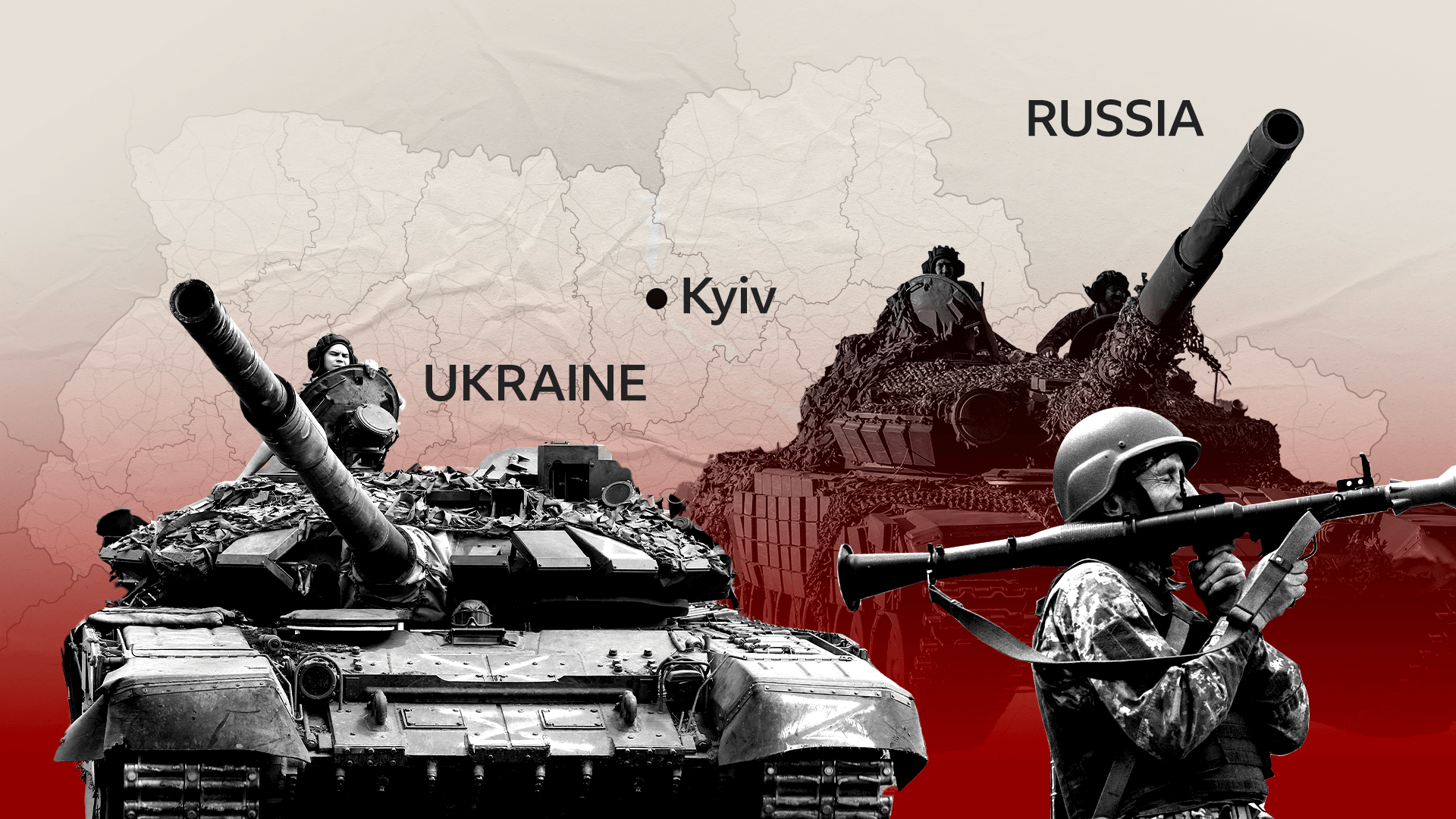Ukraine war: The lethal minefields holding up Kyiv's counter-offensive
- Published
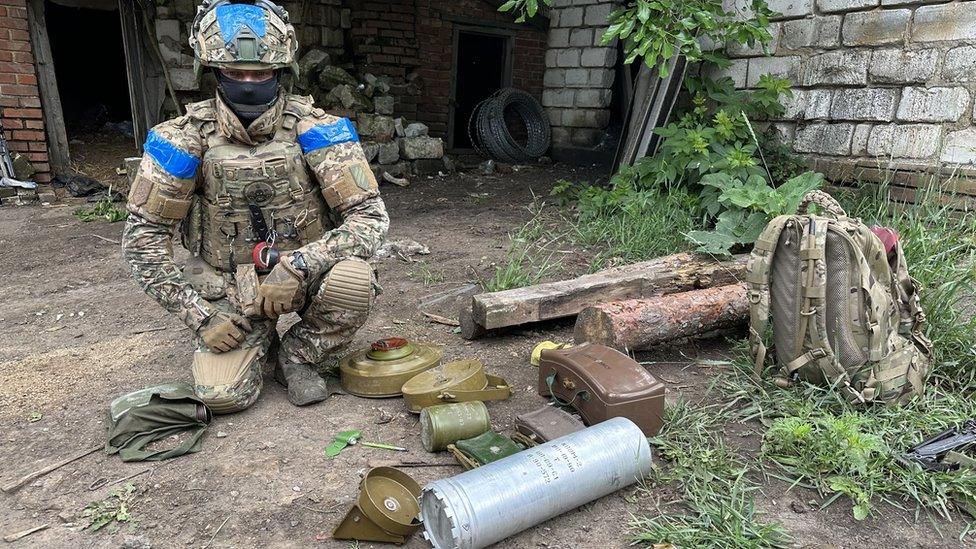
Ukrainian sapper teams come across dozens of Russian mines every day
A Ukrainian soldier drags himself through the long grass, one leg trailing limply behind him. Seconds later, a flash of bright orange and a cloud of white smoke mark the spot, just a few metres away, where yet another land mine has been triggered.
As a second badly wounded soldier pulls himself up on to the relative safety of a nearby armoured personnel carrier - arms flailing like a swimmer trying to cling onto a lifeboat - a thick smudge of dark red blood marks his agonising progress.
All this was captured, live, last week, by a Ukrainian army drone hovering overhead on the frontlines south of the Donbas city of Bakhmut. From above, the cratered minefield looked like it was covered in a haphazard rash of dark brown crop circles.
"Mines are terrifying. They scare me more than anything else," said Artyom, a 36-year-old soldier from Ukraine's 108th Territorial Defence Brigade. Two days earlier, two of his colleagues had stood on "petals" - small, green, anti-personnel mines - that had recently been scattered across a field by Russian rockets.
"Our guys were experienced. But it's hard to have eyes everywhere. Both have leg amputations. One leg each. We have [mine] injuries after every fight," said Artyom, a trained sapper, explaining that the rockets enable Russian forces to plant new mines in places that have already been liberated and cleared by Ukrainian forces.
As Ukraine's long-anticipated counterattack has not yet achieved the sort of speed and momentum that some had hoped for - including President Volodymyr Zelensky who admitted it was "slower than desired". A range of soldiers we've spoken to on different sections of the frontline have blamed Russian minefields for at least part of that delay.
"Of course, it slows down the movement of troops," said the commander of a nine-man sapper squad with the call sign Dill. He'd just finished a de-mining mission on the nearby frontlines to the east of the tiny, ruined village of Predtechyne, outside Bakhmut. He laid out an array of deactivated Russian mines on the ground beneath a tree, taking care to make sure he could not be spotted by Russian drones overhead.
"The enemy has no mercy for their own soldiers. They're used as cannon fodder. But we're trying to move forwards with the minimum of casualties," said the Lieutenant Serhii Tyshenko from the 3rd Assault Brigade, speaking from the shelter of a nearby bunker.
Some three hours' drive further south, across a succession of lop-sided pontoon bridges, Ukrainian sappers crouched by the side of a cratered road, carefully deactivating a powerful anti-personnel Claymore mine that had been hidden near an electricity pole, poised to send shrapnel into infantry or vehicles.
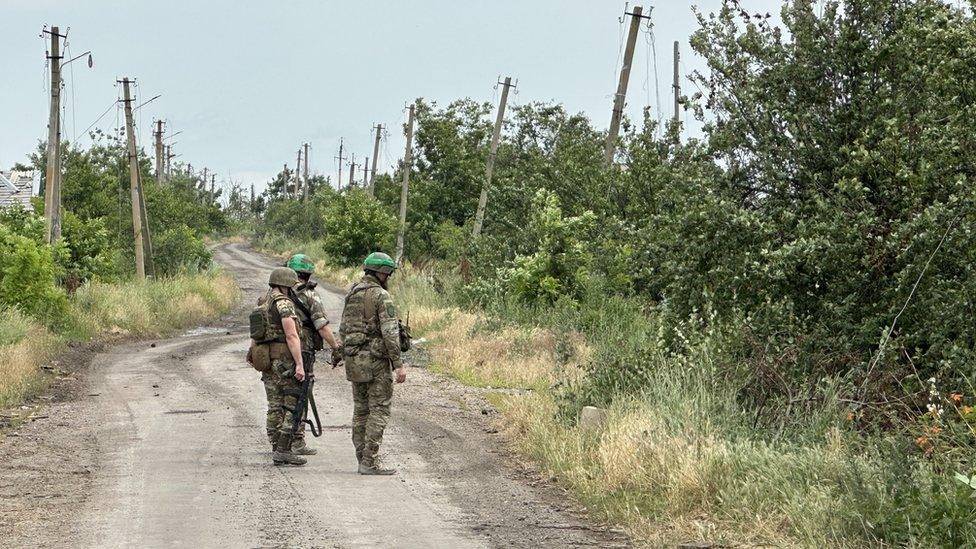
Specialised Ukrainian sapper teams are trained to deal with mines when troops come across them
"I hate this job," said Artyom, a red-bearded former garage mechanic, moments after he'd finished making the mine safe. There was a whistle, then a boom as a Russian artillery shell hit the fields nearby.
Over the lip of a nearby hill, Ukrainian infantry were slowly advancing southwards beyond the newly captured village of Rivnopil. Artyom's anger was not just a response to the dangers of minefields, but to the "sly" mentality that he felt must lie behind the act of laying mines and boobytraps, rather than fighting your enemy "man to man".
Later, in their temporary base in a cottage several kilometres away, the soldiers expressed frustration about a lack of mine-clearing equipment, and a shortage of sappers - four of whom had been injured in recent weeks.
But then Artyom showed us a large antenna and brought out a laptop to begin playing recordings of what he said were recent radio intercepts of Russian soldiers. The expletive-ridden messages appeared to indicate a degree of chaos and low morale.
"Our kamikaze drone hit [our own] car. We have one dead, another injured. Get the [expletive] out of there."
"The [soldiers] are running away. Some of them are stealing cars… 50 people have fled. They [expletive] ran away…"
The radio intercept suggested that Russian soldiers were deserting their positions after a Ukrainian artillery bombardment.
"This happens from time to time. In groups of 10 or 20 - [Russian] people disappear and leave without permission. The Russians realise we can eavesdrop on their communications but sometimes they forget," said Artyom.
He described himself as a "realist" regarding Ukraine's counter-offensive, believing that too many people "in the media and in society are in a hurry", and expecting sudden progress.
"I believe the worst option is always possible. The worst is slow [progress]," he said.
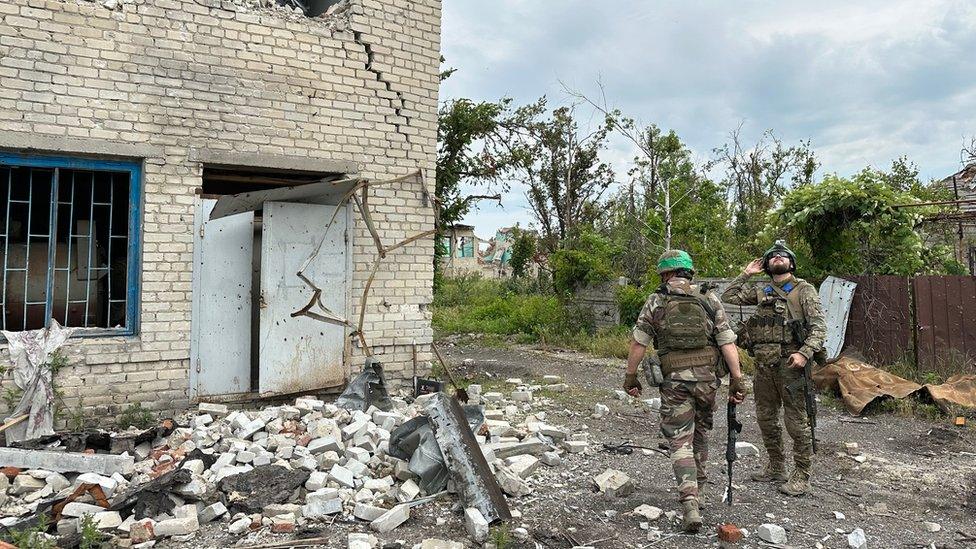
The Ukrainians say they are making slow progress
Two Ukrainian fighter jets flew low overhead with a deafening roar, followed by a succession of booms from the frontlines further south. Soon afterwards, we could hear artillery and what sounded like a longer-range HIMARS rocket system pounding Russian positions.
Ukraine's counter-offensive may be slow, and relatively cautious at this stage. But one officer, speaking on background, suggested that this patient approach would soon pay off in dramatic fashion, as long-range strikes destroyed Russia's ability to rearm frontline units, and low Russian morale provided opportunities for strategic breakthroughs by Ukrainian forces.
"You will see this soon," he said.
As for the vast stretches of minefields still lying in front of Ukraine's counter-attack - Dill, the sapper squad commander near Bakhmut, was quietly confident.
"We are learning to improvise and to invent ways to make quick, safe paths through the minefields. But we are fighting a very vicious enemy," he said.
Related topics
- Published1 July 2023
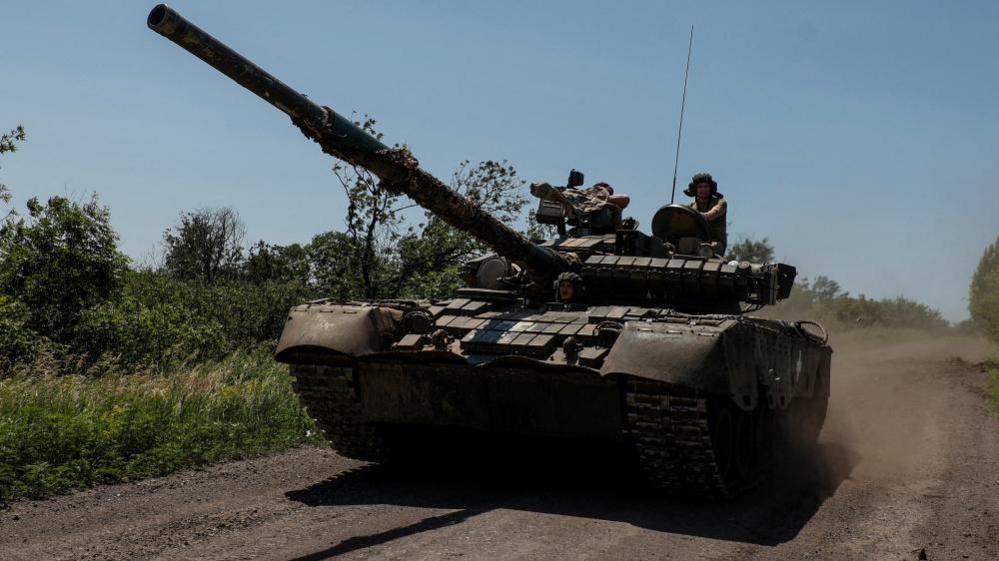
- Published1 July 2023

